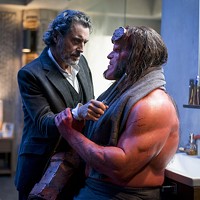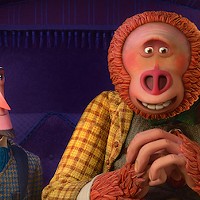

We'll get to Brad and Will and Russell in a moment, but first we need to pay our respects to Deliver Us From Evil. It may be the least publicized and most obscure of the seven titles covered this week, but it also happens to be the best.
A documentary with the power to affect even the most jaded of moviegoers, this feature-length expose from former CNN investigative journalist Amy Berg centers on Oliver O'Grady, a priest who over the course of three decades managed to sexually molest dozens -- some say hundreds -- of children throughout the state of California (his youngest victim was nine months old). In a perfect world, a bullet would have been put in his brain a long time ago; instead, O'Grady served seven years in prison and is now leading a peaceful life in his native Ireland. This is where Berg caught up with O'Grady, and one of the strengths of the picture is the complete access she had in being able to interview her subject at length. The scenes in which O'Grady waves off his past crimes as little more than youthful indiscretions -- he chuckles a lot when talking about the past -- are deeply disturbing, and his amusement while recollecting his former escapades belie his feeble claims that he's sorry for his actions and seeks forgiveness.
Had Deliver Us From Evil merely focused on O'Grady, it would still be an effective piece, yet what makes it something special is Berg's insistence on moving past the pedophile priest and examining the other, equally culpable villains of the story: the Catholic Church superiors who knew of O'Grady's crimes yet did nothing to stop his rampage (their solution was to continuously move him from one parish to another, thereby always supplying him with a fresh batch of children). Berg doesn't rely on hearsay to reveal these bishops as hypocritical monsters; she doesn't need to, since their filmed testimony during courtroom depositions exposes them as unfeeling, misogynistic (since most of O'Grady's victims were female, they dismissed O'Grady's actions as normal sexual curiosity) and, despite their profession, about as far from the guiding principles of Christianity as one can get. (Nauseating footnote: One of these creeps, the power-hungry Roger Mahony, is currently the Archbishop of Los Angeles.)
Berg also details the efforts of true Christians like Father Tom Doyle to fight for the rights of the victims -- a battle that has repeatedly led the Church to censure or demote Doyle -- and shows how the trail of denial and wrongdoing leads all the way to the Vatican. Yet for all of Berg's research and fact-finding, the most powerful sequences are the unscripted ones, the moments when O'Grady's now-grown victims and their family members express their rage at this child molester and their frustration at the Catholic hierarchy that repeatedly placed the institution's image over the welfare of the children. Especially difficult to watch is the anguish of Bob Jyono, whose daughter Ann was abused for several years by "Father Ollie" at a very young age. Mr. Jyono doesn't mince words, believing "molesting" doesn't begin to describe what O'Grady did to his offspring. "He raped her!" he bellows, tears flowing down his cheeks. In a later scene, Mr. Jyono goes so far as to denounce God, a declaration that causes Ann, still a believer despite her trauma, to begin bawling. It's a heartbreaking moment, and as we witness how these people's lives have been shattered by men who profess to work for the glory of God, we come to realize that even eternal damnation isn't punishment enough for some people.
AN AWARD WINNER at Cannes and an early favorite for Oscar enshrinement, Babel arrives courtesy of director Alejandro Gonzalez Iñárritu and writer Guillermo Arriaga, the same team that previously gave us 21 Grams and Amores Perros. Like their past efforts, Babel is a gloom-and-doom dissection of society, whipping between various characters and their interconnected storylines. Certainly, this is the duo's most ambitious undertaking, yet for all its scattered strengths, it's also the least satisfying, hampered by a structure that feels schematic rather than organic.
By the very nature of the competing story strands and arcs, all three of the pair's films have risked coming across as cinematic jigsaw puzzles, more interested in moving around pieces until they fit rather than in investing emotionally in the characters. But both 21 Grams and Amores Perros featured a haunting humanity -- to say nothing of more developed characters -- that's often missing here. I have no doubt that Iñárritu and Arriaga were sincere as they set about tackling the big issues in this latest film, but in this instance, their reach exceeds their grasp.
Their main topic here is the lack of communication that exists between people, a concept already beautifully deconstructed by Robert Altman in his 1993 gem Short Cuts. But whereas Altman focused exclusively on Los Angelenos, Iñárritu and Arriaga go global, employing the butterfly effect to show how the consequences of a specific action can be felt around the world. In one plot strand, a Moroccan goat herder (Mustapha Rachidi) buys a used rifle and gives it to his two sons with the order to shoot any jackals that threaten the herd. In a second storyline, a vacationing American couple (Brad Pitt and Cate Blanchett) are plunged into a nightmare when the wife is accidentally shot by one of the aforementioned young boys, who was merely trying to gauge the distance a bullet can travel. In another, the American couple's two children are hauled over the U.S.-Mexico border by their nanny (Adriana Barraza), whose decision to attend her son's wedding looks ill-informed once she experiences difficulty crossing back to our side. And in the final story, a deaf teenage girl (Rinko Kikuchi) in Tokyo grows increasingly frustrated as she's unable to find any male who's willing to provide her with love and compassion.
The Tokyo storyline is the best one in the film, and it further benefits from the best performance (Kikuchi is smashing as the lonely teen). And while it initially seems to be the most removed from the other three sagas, it's eventually revealed that the action of a supporting player in this section weighs heavily in the Moroccan chapters. The Tokyo interludes register the most strongly largely because they seem the least driven by obvious ideology -- the issues in the other segments, among them border disputes, Middle Eastern tensions and gun control, are handled in ways that feel overly familiar, perhaps because we've seen them tackled more adroitly in two other multistory flicks: Traffic and Syriana.
There's a lot to chew over in Babel. But because it's overstuffed, it also means that there's a lot not worth swallowing.
STRANGER THAN FICTION has been promoted as a film offering a different kind of Will Ferrell just as The Truman Show was pushed as offering a different kind of Jim Carrey and Punch-Drunk Love was sold as offering a different kind of Adam Sandler. What this means in all instances, of course, is that the comedian is toning down the patented schtick a bit -- not exactly the same as tackling a role that's equal parts Hamlet, Willy Loman and Stanley Kowalski.
Still, Carrey and Sandler both passed the test, and so does Ferrell. The actor's obnoxious characters have always distracted us from the fact that he's blessed with deep, soulful eyes, and this physical attribute here lends the proper degree of puppy dog demeanor to his role as Harold Crick, an IRS agent whose dull life is marked by rigid routine. The twist follows that Harold, in addition to living his own life, also inadvertently becomes the lead character in a book being written by reclusive author Kay Eiffel (Emma Thompson, doing distracted well), and soon Harold begins to hear Kay's voice in his head as she uncannily narrates all the minute details of his life. For help, Harold turns to a literature professor (a very funny Dustin Hoffman) who might be able to help him track down the source of the voice and ascertain whether he's trapped in a comedy, in which case a happy ending is just around the corner, or a tragedy, in which case death will come knocking.
Despite the innovative premise, the script by Zach Helm never matches the existential, mind-bending depths of, say, Eternal Sunshine of the Spotless Mind or I Heart Huckabees. This remains a resolutely mainstream offering, with flights of fancy that lightly tickle the brain but never really challenge it. The upside is that this allows a conventional love story to take root amid the high concept, and as enacted by Ferrell and the always-enchanting Maggie Gyllenhaal (playing a baker who awakens Harold's dormant passions), it's both charming and disarming. Stranger Than Fiction promises a heady experience, but it ultimately heads for the heart instead.
MOVIEGOERS WHO condemn Shortbus as porn might want to take a look at A Good Year, which offers a different form of hedonistic pleasure. Set (and shot) in the south of France, it's unabashed erotica for wanna-be world travelers, offering one orgasmic vision after another of the provincial countryside and its attendant vineyards, chateaus and lusty locals.
Based on Peter Mayle's novel, A Good Year marks a reunion between the Gladiator team of director Ridley Scott and star Russell Crowe. It's slight stuff -- a throwback to the sort of yuppie-finds-his-soul flicks that ran rampant in the 1990s -- yet it's not without its modest pleasures. Crowe plays Max Skinner, a ruthless London trader who lives only to make money -- lots of money. But when Max learns that his Uncle Henry (Albert Finney) has passed away at his chateau in Provence, he's forced to take a short leave of absence in order to handle the customary paperwork and make plans to sell the valuable estate to the highest bidder. But the longer Max stays on the property, the more forcefully his pleasant childhood memories come rushing back. Matters become even more complicated with the sudden presence of two women: a young American (Abbie Cornish) who might be Uncle Henry's illegitimate daughter and thus entitled to the estate, and a local restaurant owner (Marion Cotillard) who catches Max's eye.
Scott, used to overseeing weighty projects, tries to pump up this slender tale into something more meaningful: His tactic of choice is to bully us into always feeling something, which leads to an astonishing amount of clumsy comedy and overreaching sentiment. Crowe, on the same wavelength as his director, responds by oozing charm in every scene, a decision that makes it all the more difficult to accept the fact that his character is initially supposed to be a heartless profiteer; he's patterned after Gordon Gekko but instead comes off as one of W.C. Fields' lovable curmudgeons. Minor annoyances such as these pop up throughout the picture, but then along comes another cheesecake shot of gorgeous wine country, and whoops, off scampers our one-track mind.
IT'S A TEXTBOOK Faustian example of selling one's soul to the devil. Great Britain's Aardman Animations, the studio behind the delightful Wallace & Gromit films, has always ignored the American modus operandi of churning out loud and obnoxious toon flicks by sticking to its veddy British guns and producing works that relied on clay animation rather than CGI and clarity instead of chaos. After beginning its partnership with Hollywood's DreamWorks studio, Aardman stuck to its guns with the charming Chicken Run. Flushed Away, however, reveals that the devil is starting to collect his due.
The story of a pet mouse who gets flushed down the toilet and ends up in an underground city populated by rats, frogs, slugs and other critters, the film exhibits the frenzied pace and overbearing characterizations that have become standard in U.S.-born-and-bred animated features. The voice casting (Hugh Jackman, Kate Winslet, Ian McKellen, for starters) rests somewhere between Pixar inspiration and everybody else's laziness, but the story is strictly perfunctory -- and further hampered by the sort of puerile gags that have come to define Yankee toon flicks (lots of blows to the crotch in this one).
Where the Aardman wit is retained -- and what significantly elevates the film's worth -- is in the small details, tossed-off asides and background imagery. The main action may move forward in fits and starts, but keep your eyes on the margins and you'll remain satisfied. I laughed out loud at the briefly glimpsed newspaper headline that read, "Pied Piper Leads Thousands To Their Deaths," but I expect each viewer will spot a different favorite among the clutter and cacophony.
WHILE NOT ON the level of 1988's Imagine: John Lennon, the new documentary The U.S. vs. John Lennon is nevertheless an engaging and informative film about the period in the life of the former Beatle during which he emerged as a political activist and, consequently, a thorn in the side of the Nixon administration. Convinced that the massive popularity of Lennon would lend voice to the antiwar activists with whom he hobnobbed at the height of the Vietnam conflict, the government sought to have Lennon and his soulmate Yoko Ono tossed out of the country, a lengthy legal battle that ultimately ended in defeat for the right-wing warhawks.
The movie doesn't really cover any new ground or offer up any surprising revelations, but its use of fascinating footage from the period (much of it long unseen) provides it with a potent kick of "you are there" nostalgia. Walter Cronkite, G. Gordon Liddy, Strom Thurmond and Bobby Seale are among those appearing throughout the picture (some filmed then, some shot now, some making appearances in both the past and the present), though Gore Vidal is the only one to point out the obvious similarities between Nixon-era America and Bush-era America ("Lennon represented life ... Nixon, and Bush, represent death").
When contrasted with such raging radicals as Jerry Rubin and Abbie Hoffman, Lennon seemed like a political lightweight, a point that's repeated by many folks throughout the course of the film. Even Lennon joins the chorus with some self-effacing remarks, insisting that he and Yoko are artists rather than politicians, and that if championing peace over war makes him a clown, then so be it. Yet as we cast a doleful eye at the world today, and as we imagine John Lennon's sincerity in raising the flag for peace and love, I say (with apologies to Stephen Sondheim): Send in the clown.
HEAVEN HELP US, this is one godawful movie. A grotesque adaptation of Augusten Burroughs' best-selling memoir, Running With Scissors is alternately grating and boring, as deadly a combo as one could imagine sitting through for two unendurable hours.
Young Joseph Cross plays the Augusten surrogate, a teenage lad saddled with a lunatic mother (Annette Bening) who's convinced that she's going to strike it rich as a writer some day. Once his parents divorce, Augusten is sent to live with Mom's eccentric psychiatrist (Brian Cox) and his equally out-there brood: wife (Jill Clayburgh), daughters (Evan Rachel Wood and Gwyneth Paltrow) and adopted son (Joseph Fiennes). Writer-director Ryan Murphy displays no feeling for or understanding of these characters, and, as a result, their colorful behavior comes across as repellant rather than ingratiating. Instead of drawing us into the movie, Murphy's ham-fisted approach insures that we're perpetually kept at arm's length.
The cast labors mightily, but most of the performers are either mishandled or miscast. The primary exception is Alec Baldwin, whose understated work as Augusten's alcoholic father, paired with his memorable supporting turns in other recent films (The Cooler, The Aviator, The Departed), suggests that Hollywood directors ought to consider going back to handing him larger roles. Besides, it's Baldwin who delivers the film's most truthful line. "This is bullshit!" he rages at one point. Why, yes, Alec, yes, it is.
DELIVER US FROM EVIL
***1/2
DIRECTED BY Amy Berg
STARS Oliver O'Grady, Tom Doyle
BABEL
**1/2
DIRECTED BY Alejandro Gonzalez Iñárritu
STARS Brad Pitt, Cate Blanchett
STRANGER THAN FICTION
***
DIRECTED BY Marc Forster
STARS Will Ferrell, Emma Thompson
A GOOD YEAR
**1/2
DIRECTED BY Ridley Scott
STARS Russell Crowe, Albert Finney
FLUSHED AWAY
**1/2
DIRECTED BY David Bowers & Sam Fell
STARS Hugh Jackman, Kate Winslet
THE U.S. VS. JOHN LENNON
***
DIRECTED BY David Leaf & John Scheinfeld
STARS John Lennon, Yoko Ono
RUNNING WITH SCISSORS
*
DIRECTED BY Ryan Murphy
STARS Annette Bening, Gwyneth Paltrow




